Guest Contribution by Jean McCarthy.
Reading Time: ~5 minutes
Featured Image Source: Image by Saydung89 on Pixabay
In this post:
- Introduction
- Supporting Students with Appropriate Structure
- Designing Meaningful Assessments
- Creating an Environment that Values Students
- Conclusion
Introduction
Despite the pandemic, my initial emergency remote panic, and the fundamental shift in the way we now deliver learning experiences for our students, I’ve realised that the basics of teaching remain the same. For me, beyond the development of specialist knowledge and skills, that means supporting students with appropriate structure, designing meaningful assessments with clear tasks, and creating an environment that values students, both as individuals and as a group. I am certainly no expert in online teaching, but here are some of the practices that are working for me and my students right now. Included are some screenshots from three of my Sulis module sites, PM4067 Contemporary Issues in Organisational Behaviour, PM6131 Research Methods, and PM4014 Human Resource Development.
Supporting Students with Appropriate Structure
I organise my module site on Sulis (with special thanks to our KBS Learning Technology team for layout ideas and instruction) with a Module Overview section as follows:
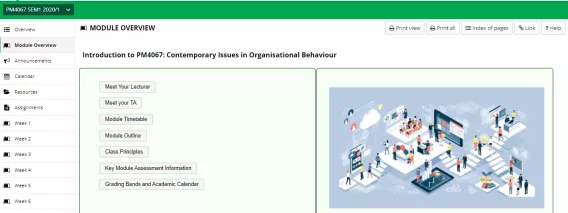
This section is available from Week 0. For example, here, I made a video introducing myself for the Meet Your Lecturer tab:
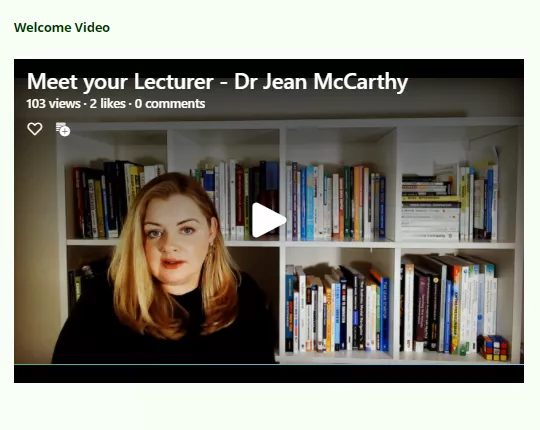
I think it’s helpful for students to “see” me and hear me before classes begin. I don’t make reference to a specific module in this video, but I do outline my approach to teaching and learning so that initial expectations are set. I re-use this video for all of my modules, saving some recording time.
I am explicit about when and how the module will be delivered in the Module Timetable tab:

I also include (appropriate to Week 0) assessment information, detailing the number and type of assessments, basic instructions, due dates, etc. Later in the semester, usually around Week 3, I create a specific Assessment Hub or Exam Hub page which delves further into assessments, to include assessment rationale and instructions (in video format), sample or review questions, preparatory reading etc.:
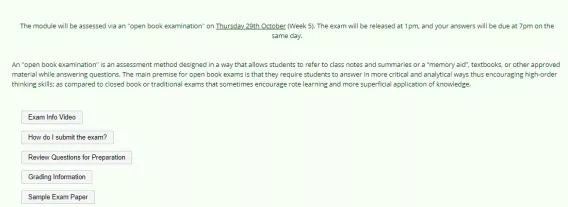
Each week, then, all material is posted to a weekly page, using numbered sections to guide the students through the material:
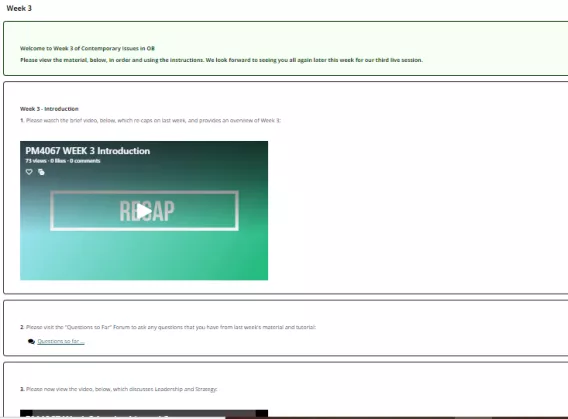
And I send out an agenda in advance of any live session via the Announcements tool on Sulis:
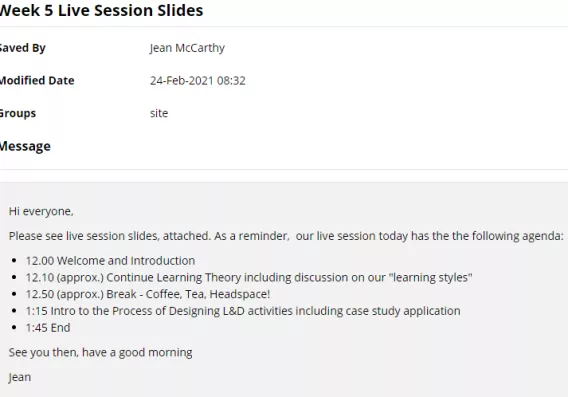
Designing Meaningful Assessments
My goal, within the context of my discipline, is to develop students as scholar-practitioners; those who ground their practice in research and theory, champion research and theory in the workplace, bring practical insights into theory and research development, and disseminate findings from their own research and practice. As such, I develop assessments that place students in the role of a “practitioner”, using case studies, presentations, and simulations, where they get to solve an organisational problem using evidence, based on the learning outcomes of the module. I have found that this “real world” active approach gets students more engaged (and, sometimes, even excited) about their assessment, particularly in this new environment. My second-year students are currently developing an onboarding programme for a small (semi-fictitious) organisation who have “just hired 40 new employees”.
Creating an Environment that Values Students
I felt it has been important to openly acknowledge the various challenges we are all dealing with right now, and this has helped students to feel more valued as people, especially since we can no longer meet them face to face, or have those important chats before and after class. So, I adapted a set of Covid-19 Class Principles disseminated by Brandon Bayne at the University of North Carolina and created an infographic, as shown below. These principles have set a positive tone for the semester among each group.
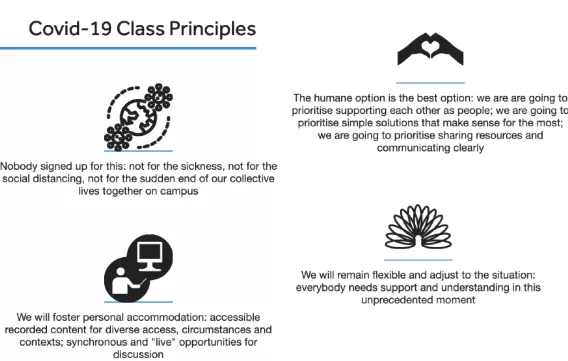
Conclusion
These are my personal reflections on what is working to engage and support students in the context of my remote teaching – I would love to hear more on what is working for others. If you would like to contact me about anything in my post, my email is Jean.McCarthy@ul.ie
Thanks for reading!
About the author
Dr Jean McCarthy is a Lecturer in Organisational Behaviour at the Kemmy Business School (KBS), and is Chair of the KBS Teaching and Learning Committee.